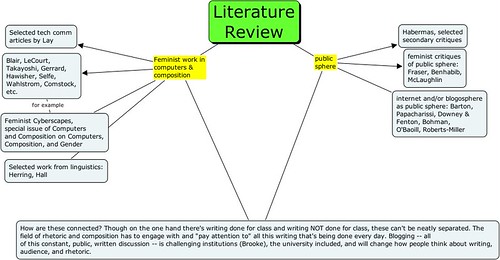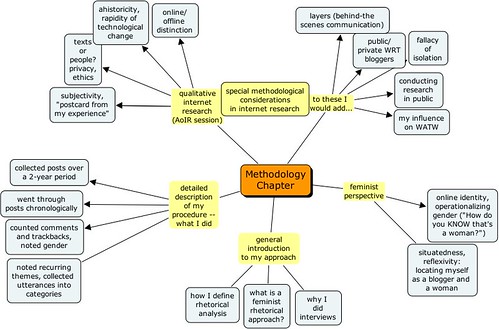I've been very reluctant to write this post lest it spur another round of "Where are the women?" for me to contend with, but I figured it was time for a dissertation post. I owe it to you, right? Well, a while back I finished Chapter 4 and am now in the process of revising it. In Chapter 3, I give a thorough overview and chronological description of the "Where are the women?" case: the posts, descriptions of the (onymous) people involved, and the contexts and exigencies of each instance of WATW. For example, the Larry Summers speech had a degree of influence on many of the comments. I also give a more detailed micro-rationale for my project than I give in the introduction. To clarify a bit, the macro-rationale is "why rhetoric should study blogging" and the micro-rationale is "why the 'Where are the women?' case." As anyone who has participated in them can tell you, the WATW threads are quite rhetorically unproductive; nothing really changes as a result of them, and that's one reason I find them so interesting. So in Chapter 3, as part of my detailed micro-rationale, I bring in some of the MANY metacommentaries and parodies of WATW, plus some of the interview responses.
Now for Chapter 4. I'm mostly drawing upon Nancy Fraser's article "Rethinking the public sphere: A contribution to the critique of actually existing democracy," but in this chapter I'm not going into her thoughts about multiple, subaltern counterpublics. I'm more interested in the four problematic assumptions she points out on which Habermas’ idea of public sphere rests: first, that inequalities in social status can be “bracketed” in a public sphere; second, that a singular public is preferable to multiple publics; third, that issues and interests deemed “private” should be excluded from the discussion; fourth, that a public sphere’s fruition depends on keeping “civil society and the state” separated (p. 117-118). Fraser claims that “[o]ne task for critical theory is to render visible the ways in which societal inequality infects formally inclusive existing public spheres and taints discursive interaction within them” (p. 121). That task, rendering visible these inequalities, is the raison d'être of this chapter.
I'm reviewing the various stereotypes and ideas about women's speaking in public that get tossed around in WATW. To illustrate, see this comment, and tell me if this guy didn't totally nail the "maiden, mother, crone" archetypes/stereotypes that feminists have been talking about for years (sincerely, I think this is really well put):
[I]n the world of Big Punditry women get one of three jobs:
1. The Soft-core Liberal Infobabe. Doesn't say or do much. Her entire function is to perpetuate the idea that if you're a liberal, you can have sex with women like this.
2. The Breast-Feeder from Hell. Begins every argument with "As a mother, I ..." Uses nurture six times in a single paragraph. Her function is to serve up chocolate-covered liberalism to guilty insecure housewives.
3. The Uppity Old Lady in Tennis Shoes. See Molly Ivins. This is where Infobabes go when they get put out to pasture. They're supposed to be sort of funny - Driving Miss Daisy kind of funny.
Specifically, I look at 1.) the role of sex, beauty, and attraction and how it can create noise; 2.) "women aren't interested in politics; they're more interested in fashion, gossip, and babies"; 3.) "women and men communicate differently," i.e. the "women can't handle the food fight, boxing match, swashbuckling, Crossfire, Hardball, insert agonistic metaphor here flavor of political debate"; 4.) "women are too busy with the house and the kids to have time to blog"; and 5.) "women aren't as technologically savvy as men." Mind you, I'm not saying there isn't any truth in any of these, especially #4. I'm just laying them out there. I may say more about these later, but for the vignette I want to focus on #2, because there are pictures!
Consider these sample comments:
There are simply less females than males passionate about politics, hence less females blogging.
If there is a blogosphere concerned with sales at Nordstroms or Hollywood gossip, that blogosphere will be predominately female. (Reader at Kevin Drum's weblog)
and here:
As for the gender thing, I still don't know if this is a problem in search of a solution or just the way women are. I'm leaning toward the latter, frankly. They don't like war, don't like hard-nosed arguments and have a hard time separating the personal from the political. Case in point, a girlfriend the other night told me Bush was too stupid to be president, and anyway she didn't like his family--his daughters didn't seem engaged enough (unlike who? Chelsea? Amy Carter? I was confused). This, apparently, was enough to decide her vote--Laura is a bit chunky and I don't like her shoes, it's settled!
Let me first say that I mean no disrespect toward the people who made these comments. The ideas represented here have a long history. In fact, in keeping with Jonathan's creative 'Aleatory Research' methodology, I happened upon some political cartoons from the suffragist movement, which I ended up using in the chapter. From January 27, 1909, a comic by T.E. Powers titled "When Women Get Their Rights":

Also from the 1910s:

The caption says, “Woman Devotes Her Time to Gossip and Clothes Because She Has Nothing Else to Talk About. Give Her Broader Interests and She Will Cease to Be Vain and Frivolous.”
I'll stop there; this is only a vignette, after all. As always, feedback is welcome.







